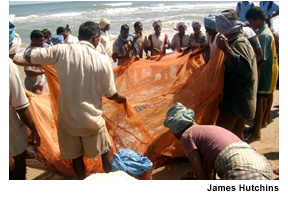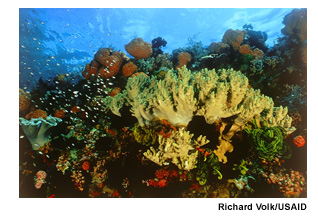Coastal Resources Management
 |
Sustainable fisheries management is essential to
food security, household livelihoods, vibrant economies
and healthy ecosystems in coastal areas. |
The Value of Coastal Ecosystems
Coasts contain some of the planet’s most biologically productive habitat, and support a disproportionate amount of economic value to human society. For example, more than half of the world's population lives and works in a coastal strip just 200 km wide. A full two-thirds-four billion people-are found within 400 km of a coast. All but two of the world's mega-cities are located on the coast.
Oceanic systems yield 80 million tons of seafood per year valued between $50 and $70 billion. Globally, the marine catch supplies a major proportion of animal-protein consumed by people and is a particularly important source of protein and income within developing countries. A full 2.6 billion people in developing countries rely on seafood for more than 20% of animal protein consumed. The majority of commercially important marine fish and shellfish species spend at least a part of their lifecycles within estuarine ecosystems.
Maritime commerce, oil and gas production, aquaculture, pharmaceutical and industrial biotechnology, tourism, and recreation are but a few of the manifold human uses of the coastal zone whose values are not easily quantified. Add to these the myriad of free ecological services-storm surge protection, water filtration, waste discharge and dispersal, and industrial and power plant cooling, to name but a few-as well as the socioeconomic benefits and one can see that the ecological importance of the coastal zone is virtually unparalleled.
In groundbreaking resource valuation research, one researcher estimated the annual value of coastal goods and services (even excluding the value gained from the open ocean) at over $12 trillion - ahead of all other ecosystems.
 |
Coral reef ecosystems—rich in biodiversity and abundant
sources of food and income—need active, participatory
management. |
The Threats to Coastal Ecosystems
There are multiple threats to coastal ecosystems globally and, in turn, the ecological goods and services they offer. As stewards of coastal zones, we undermine our own efforts at conservation with widespread habitat degradation and loss, over-harvesting, and destructive fishing. Half of the world’s wetlands were destroyed in the 20th century, and a quarter of coral reefs are now lost. The global oceanic fishing fleet is today 40% larger than what the oceans can sustain. Half of commercially important marine and inland fish stocks are fully exploited, while another quarter is over-fished, depleted, or recovering. Meanwhile, the use of dynamite, cyanide, and other destructive fishing practices may very well be the final "nail in the coffin" for marine ecosystems and economies in some areas. The most direct negative impacts of these losses fall on poor, resource-dependent households in coastal areas.
The timing, volume, and quality of freshwater inflow to estuarine environments are additional factors in coastal productivity that are often undervalued or poorly understood. With increased water diversions for human use, a growing number of rivers today are severely altered and in some cases no longer reach the sea (e.g., the Yellow River in China; the Colorado River in the U.S.) - adversely impacting coastal ecosystems. Add to this the many problems associated with the degradation of water quality, and it becomes easy to appreciate that successful management of water resources is clearly central to the long-term use of coastal resources.
Integrated Coastal Management
During the past three decades, integrated coastal management (ICM) has gained considerable momentum across the globe, as a complementary approach to broader integrated water resources management (IWRM) practices. As a field, ICM has provided leadership and developed resources management that can be widely drawn on in all aspects of water resources management. A consensus has emerged that without diligent attention to the appropriate policy framework, laws, institutions, and decision-making processes, chances for long-term success are exceedingly low.
Successful ICM and IWRM are as much processes in participatory governance and community stewardship as they are strategies to achieve tangible environmental and socioeconomic improvement in the short term. They are equally directed to creating stakeholder voice and ownership in a governance process that builds political will as they are to placing certain areas and resources under protected status. The best programs incorporate both regulatory and non-regulatory controls and incentives, and they establish a central role for science in the identification and assessment of priority needs and formulation of strategy. Effective ICM is tackled at the ecosystem scale, with strong emphasis on water resources management. Successful integrated coastal management is ultimately about forging the right balance between competing human uses of water, coastal, and other natural resources, while ensuring that environmental health and productivity - and the sustainable well-being of human communities - are not compromised in the long term.
For more information on Coastal Resources Management:
Back to Top ^
|


